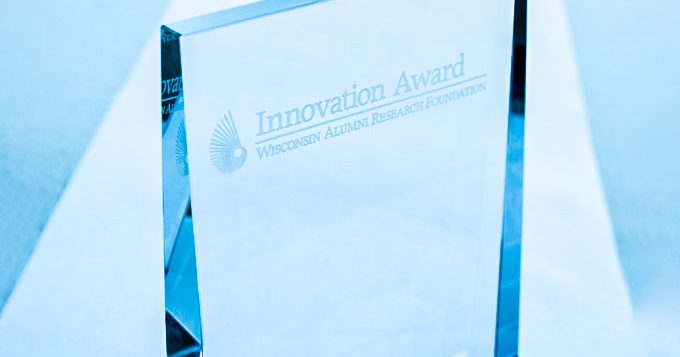Two UW-Madison teams selected from 400+ innovation disclosures
CONTACT:
Jeanan Yasiri Moe
Director of Strategic Communications and Public Affairs
[email protected] | (608) 960-9892
MADISON, Wis. – A protein that could regenerate heart tissue and a new treatment for diabetes and obesity have taken top honors from WARF.
The first 2023 WARF Innovation Award has been given to the University of Wisconsin-Madison’s Ahmed Mahmoud, assistant professor of cell and regenerative biology; Timothy Kamp, professor of medicine; and Youngsook Lee, emeritus professor of cell and regenerative biology; for their work, Regenerating and Renewing Heart Tissue.
The team discovered a protein, LRRC10, that activates heart renewal and regeneration in animal models. This discovery could lead to a therapeutic that restores cardiac structure and function in human heart failure patients.
The other winning team includes Samuel Gellman, professor of chemistry; postdoc Kyle Brown and graduate student Rylie Morris for their work, Potent New Drug for Type 2 Diabetes, Obesity.
With the commercial success of two well-known brands, pharmaceutical companies have an intense interest in additional therapeutics for the treatment of both obesity and type 2 diabetes. This team of chemists developed a synthetic peptide that uses a more simplified design to target the same mechanisms of the drugs currently on the market.
An independent panel of judges selected the winners from a field of six finalists drawn from several hundred invention disclosures submitted to WARF over the prior 12 months. The winning teams each receive an award of $10,000, with the funds going to the named UW-Madison inventors.
“Every year, our Innovation Awards cast a spotlight on exciting early-stage discoveries on campus,” says Erik Iverson, CEO of WARF. “We’re pleased to celebrate the nominees and all UW-Madison innovators working to discover and translate research with the power to impact lives.”
The other 2023 WARF Innovation Award finalists are:
New Therapeutic for Glioblastoma, the Most Lethal Form of Brain Cancer
- Mahua Dey (Neurological Surgery)
- Jacques Galipeau (Medicine)
Novel Alloy Better Protects Jets at High Speeds, Temperature
- Dan Thoma (Materials Science and Engineering)
- Michael Niezgoda (Materials Science and Engineering)
Eavesdropping on Insects to Better Protect Crops from Infestations
- Emily Bick (Entomology)
Enhanced Valley Splitting in Silicon-Based Quantum Hardware
- Benjamin Woods (Physics)
- Mark Friesen (Physics)
- Mark Eriksson (Physics)
- Robert Joynt (Physics)
- Emily Joseph (Physics)
About WARF
Incorporated as a nonprofit foundation in 1925, WARF has a founding purpose “to promote, encourage, and aid scientific investigation and research at and within the University of Wisconsin-Madison.” Over 98 years the foundation has funded more than $4.4 billion in cumulative research grants to UW-Madison and the Morgridge Institute for Research (adjusted for inflation), has been issued more than 4,200 patents (with 2,200 active patents), generates an additional 375 invention disclosures and 55 revenue-generating licenses each year, and has helped create 190 startup companies based on UW-Madison technologies. For more information, visit warf.org and watch a video about how WARF stewards the Cycle of Innovation.
###
